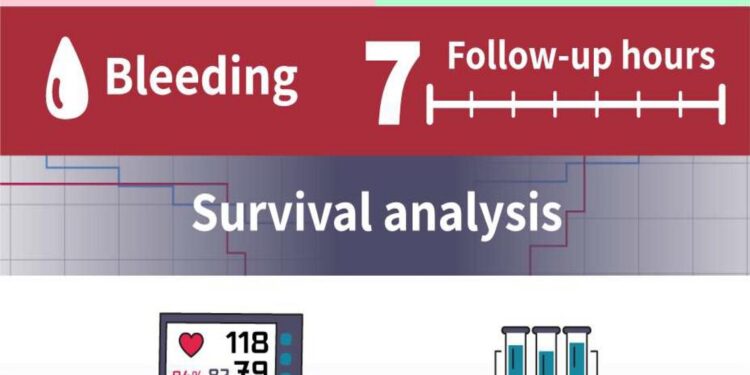Study design. Credit: Scientific relationships (2025). DOI: 10.1038 / S41598-025-92310-3
Researchers from the Hebrew University of Jerusalem and the FDI medical profession have discovered a new promising therapeutic approach to treat the hemorrhagic shock, a fatal condition caused by a severe blood loss which remains the main cause of preventable death in cases of trauma in the world.
The study, led by Dr. Ariel Fure and Dr. Maya Simchoni, of the Institute for Research in Military Medicine, a joint project between Hebrew University-Hadassah Medical School and the medical profession of defense forces Israel (IDF), demonstrates that the activation of Kinase C Epsilon (PKC -ε) Physiological stability after severe hemorality.
The work is published in the journal Scientific relationships.
In a carefully controlled experience using a pig model, researchers have induced hemorrhagic shock by removing 35% of the total blood volume of animals.
The animals treated with an activator pkc -ε activator only five minutes after the start of bleeding showed considerably improved survival – 73% of the subjects treated survived, against only 25% of untreated people. In addition, treated animals have maintained significantly better cardiovascular stability, including blood pressure, heart rate and heart flow, all critical indicators of an effective response during serious trauma.
In addition, a detailed analysis of the mitochondrial activity revealed an increased function in the heart tissues of animals receiving the activator PKC-ε. As mitochondria are vital cellular energy producers, these results suggest that PKC -ε activation helps maintain organ energy levels under stress, potentially protecting tissues against other damage associated with severe blood loss.
The implications of this study are of great range. The current therapeutic strategies of severe hemorrhagic shock often imply fluid resuscitation, which can involuntarily exacerbate tissue lesions by triggering an ischemic-reperfusion lesion.
This new approach – administering a PKC -ε activator peptide – has the potential to considerably minimize these harmful effects, thus improving the chances of survival and reducing the complications associated with severe trauma.
Dr. Ariel Furer commented on the wider implications: “Massive hemorrhage remains one of the most critical challenges faced by emergency medicine, in particular in the battlefield and civil trauma scenarios. Our results suggest that activation of PKC-ε can be a highly effective therapeutic approach, perhaps the potential transformation of trauma care Medical respondents on the front line with a powerful tool for patients for patients. ” “.
This study marks a step forward criticism in traumatic medicine. However, Dr. Fure note that an additional clinical research is necessary before this treatment can be largely adopted in a clinical environment.
“Our results open up new avenues for targeted therapeutic strategies which can be administered by the first stakeholders in an emergency, which potentially saves countless lives around the world,” concludes Dr. Furer.
“Future clinical trials will be essential to validate these promising results and progress towards practical implementation.”
More information:
Maya Simchoni et al, the activation of the Epsilon of the Kinase C protein improves early survival in an acute pork model of controlled hemorrhage, Scientific relationships (2025). DOI: 10.1038 / S41598-025-92310-3
Supplied by the Hebrew University of Jerusalem
Quote: Experimental treatment of peptides could triple survival rates in cases of severe blood loss (2025, May 5) recovered on May 5, 2025 from
This document is subject to copyright. In addition to any fair program for private or research purposes, no part can be reproduced without written authorization. The content is provided only for information purposes.



